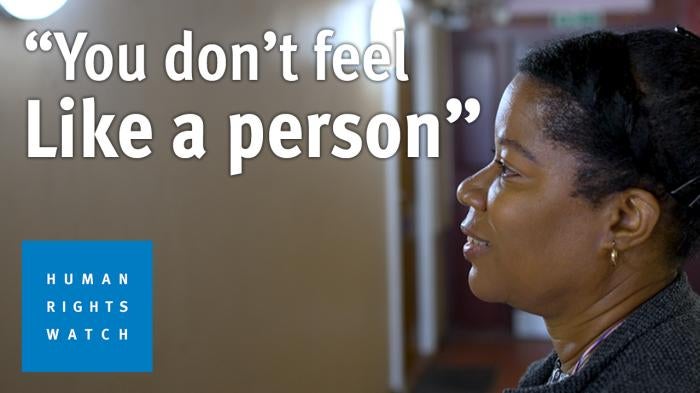(London) – Children in London are growing up in substandard and uninhabitable “temporary accommodation” as a result of persistent policy failures by central and local government, Human Rights Watch and the Childhood Trust said in a joint report released today. The UK government is failing in its duty to ensure the right to adequate housing for homeless families.
The 51-page report, “I Want Us to Live Like Humans Again”: Families in Temporary Accommodation in London, UK,” examines how families across London are being placed in poor quality and uninhabitable accommodation, significantly violating their rights. The situation is due to a combination of reduced funding for local authorities, austerity-motivated cuts to the welfare system, and a lack of affordable permanent housing.
“The government needs to urgently address this hidden aspect of the housing crisis by reducing reliance on temporary accommodation and tackling the issue of housing unfit for families to live in,” said Alex Firth, senior coordinator at Human Rights Watch. “If the government is really committed to its agenda of ‘levelling up’ every part of the UK, then giving families a safe and decent home to live in should be the foundation of its efforts.”
Between May 2021 and October 2021, Human Rights Watch interviewed 75 people, including 33 who were either currently living in, or had recently left, temporary accommodation in various boroughs across London. Real names of interviewees are used, except where the interviewee requested that we use a pseudonym largely owing to the stigma associated with living in temporary accommodation.
People interviewed described conditions including toxic mold, cold temperatures, and a lack of adequate space in their temporary accommodation. These poor conditions constitute a violation of the right to adequate housing and children’s rights to an adequate standard of living. The situation is worsened by the fact that some families live in “temporary” accommodation for several years.
In Lambeth, Amaka L., a pregnant mother with three boys, ages four, seven, and nine, lived for six months in 2020 in a studio flat. The room was so small that they all had to share a double bed. She said the situation deteriorated when the pandemic started. “It was very, very hard for me in that small flat. The council just put me there and left me. When Covid started I saw hell.”
In Croydon, Layla W., and her four daughters, aged 6 to 26, were placed in a three-bedroom house between 2017 and 2019 by Southwark Council. Her youngest daughter, Israa, was six years old when she moved into the house and had no pre-existing health conditions. However, the house had toxic mold and Israa’s bedroom was “the worst room in the entire house, it was unimaginable.” She developed respiratory issues while living there and was diagnosed with asthma, as well as needing an operation to assist with her irregular breathing.
In Wandsworth, Jada T., a 15-year-old girl who lived in an apartment block between 2018 and 2020, described how the parts of metal in her bedroom wall had rusted and cracked, letting in cold temperatures during winter. She was diagnosed with pneumonia and her mother sent her to live with family outside of London in October 2018 so she could recover, causing her to miss two months of school.
Every child deserves a stable and decent home as a foundation to succeed in education. The situation was even worse during Covid-19 related school closures. The lack of space made it harder for children to concentrate or find a quiet environment to do their work. Most people interviewed also said their temporary accommodation lacked a Wi-Fi connection.
Local councils are obligated by English law to provide people who are threatened with homelessness, or have recently become homeless, with temporary accommodation. The number of families in temporary accommodation has increased 65 percent since 2011. As of October 2021, there were 42,290 families living in temporary accommodation in London.
The government has committed to an agenda of “levelling up” the UK in an attempt to address regional inequalities while improving conditions throughout the country. London should not be left out of this, with the capital having the highest child poverty rates in England and also housing 70 percent of all families in temporary accommodation. The housing crisis in London should be a major focus of the government’s agenda, Human Rights Watch said.
Part of the problem, Human Rights Watch found, is that the central government reduced its funding to local authorities, by 37 percent in real terms between 2009-10 and 2018-19, with London facing the largest cuts. In response to the growing homelessness crisis, local authorities have had to increase their spending on short term fixes that do not address the root of the problem.
One other major contributing factor is the lack of social housing. Local authorities highlighted to Human Rights Watch that inadequate levels of social housing in their boroughs made it difficult to provide people with more permanent housing. The problem is most acute in London, with some boroughs having a waiting list of over ten years.
Under international law, the right to adequate housing is part of the right to an adequate standard of living. Yet, successive UK governments have failed to recognize and implement this right. The UK government should enshrine the right to housing in domestic law and ensure that victims of violations of this right have access to speedy and effective remedies, Human Rights Watch said.
“Successive governments have utterly failed to fix the housing crisis,” said Laurence Guinness, chief executive of the Childhood Trust. “Children are suffering appalling abuses of their rights with devastating consequences for their health, education, and life chances. This report is a wake-up call to the government that this abuse has to stop.”








